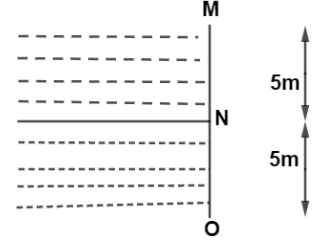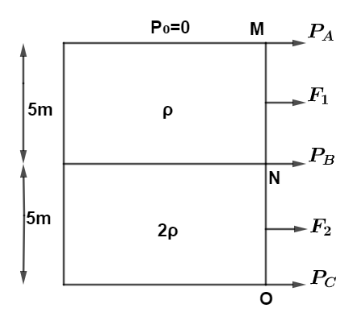Question
Question: Two liquids of densities \({\rho _1}\) and \({\rho _2}({\rho _2} = 2{\rho _1})\) are filled up behin...
Two liquids of densities ρ1 and ρ2(ρ2=2ρ1) are filled up behind a square wall of side 10m as shown in figure. Each liquid has a height of 5m the ratio of forces due to these liquids exerted on upper part MN to that at the lower part NO is (Assume that the liquids are not moving)

A. 31
B. 41
C. 21
D. 32
Solution
In order to solve this question we need to understand buoyant force. We know from Newton’s laws of motion that any material opposes the change in its state so when water or any liquid is being pressed by some object then water opposes this behavior in its change of state and hence it exerts an upward or buoyant force on the volume of object inside liquid, this is known as buoyancy.
Complete step by step answer:
Here we can use formula: P=ρgh→(i)
Where, P is pressure, g is acceleration due to gravity, “h” is height of the water column above the point at which pressure acts and ρ is the density of liquid.
Also we would use, F=PA→(ii)
Where, F is force, P is pressure applied and A is area.
Considering Pressure at different point shown in figure,

So at A point there is no liquid above it so pressure at “A” point is, PA=0.
Similarly at “B” point height of liquid above it is, h=5m.
And the liquid of density ρ1.
So the pressure at “B” point is,
PB=5ρ1g using (i)
Similarly at “C” point height of liquid of density ρ1 is h1=5m and height of density of liquid ρ2 is, h2=5m
Using (i) we get pressure at C point equals to,
PC=ρ1gh1+ρ2gh2
Using ρ2=2ρ1
Putting values we get,
PC=5gρ1+10gρ1
⇒PC=15gρ1
So the pressure on wall MN is, FA=2(PA+PB)A using (ii)
Putting values we get, FA=25gρ1A
Also pressure on wall ON is, FB=2(PB+PC)A
Putting values we get, FB=220gρ1A
So, FBFA is given by,
FBFA=220gρ1A25gρ1A
∴FBFA=41
So the correct option is B.
Note: It should be remembered that pressure applied at any point is only applied by liquid above it and not by liquid below it also acceleration due to gravity is only acceleration that is applied here if the liquid is under some acceleration in any other direction the pressure applied would be changed. Also viscosity is defined as force of friction between layers of liquid.
